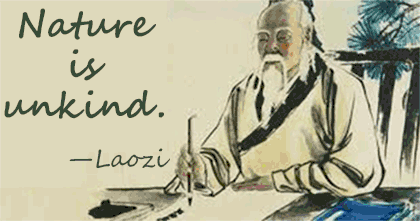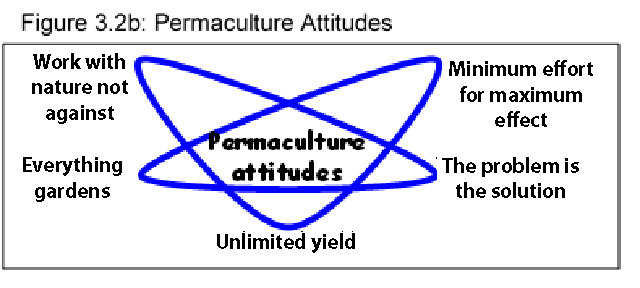
THURSDAY, FEB 23, 2023: NOTE TO FILE

Permaculture's David Holmgren
My evil twin
Eric Lee, A-SOCIATED PRESS
TOPICS: ODUMITE, FROM THE WIRES, A BETTER VIEW
Intro: I took the online Gaia Education's Ecological Design course that counts towards a MA or PhD degree in some universities. The two facilitators were certified permaculturists, and many students expressed their enthusiasm for permaculture. I view permaculture as an extension of organic farming and would add agroecology, holistic planned grazing, and the recent rise of regenerative agriculture to the energy-blind forms of agriculture the Odum brothers (a science historian's view Charlie Hall, one of H.T. Odum's PhD students and founder of biophysical economics the Gaia Education course celebrated, read and agreed with) had hoped their science could give rise to. They failed. We fail.
Unlimited yield, from Module 3-9, Permaculture design system for illimitable abundance, And the problem that is the solution is to note that, "For the first time in history a conviction has developed among those who can actually think more than a decade ahead that we are playing a global endgame. Humanity's grasp on the planet is not strong. It is growing weaker. Our population is too large..." — Edward O. Wilson, Half Earth: Our Planet's Fight for Life 2016 [emph added].
COOS BAY (A-P) — In popular culture, for every position or possible point of view, there are for and against narratives told by storytelling animals. If the story is 'evolution' of life, some merely eloquent tellers of tales are remorselessly against. Others are true believers in evolution who dogmatically assert the fact of evolution, and decry the ignorance of true verities of those who are against any theory of evolution. Another view is that 'for' and 'against' thinking is the worst disease of the mind.
David Holmgren was teethed on the same offerings as I, a year and a half elder to him, was. I read H.T. Odum's Environment, Power, and Society as a new book in 1971, and Limits to Growth the next year. After high school, I too hitchhiked around the country I, by an accident of birth, had been born in, and went to a small college to study agriculture. My life partner is Sue (with an 'e', his being Su). In the 1970s I also came to understand that energy (rather than money) makes the world go round.
So, while not quite true, assume that everything I think I may know is exactly what Holmgren believes to be true. So that would put him in my 'for' camp. Assume he would agree with everything I type for consideration. Would that put him in my 'friend/supporter/source' camp or in my worst 'enemy/threat/distraction' camp?
The idea of working with rather than against nature is a song I also sing. In 2002 Holmgren dedicated his book Permaculture: Principles and Pathways Beyond Sustainability to Howard Odum’s memory, published a few months after Odum's death. In the Odums' last book, A Prosperous Way Down, published a year before Holmgren's book, Odum called the future of humanity one of energy descent.
So Holmgren and I heard the same thing, but we may dance a different jig. I don't believe a word Odum says, much less any that my brain subvocalizes. I can tell stories, but I don't believe in them. Holmgren tells better stories and many believe in them (as there is a mountain of evidence that many modern techno-industrialized humans do). I view Odum as my mentor by proxy (his books), and Holmgren no doubt does too, but I can claim no approval. If I could channel Odum my guess is he'd say, "your interest in my work is unusual, but you neither understand it nor do I think you ever will, so you'd do better to walk the beach and maybe find a prettier shell than usual or even a bit of flotsam from Japan."
Like Holmgren, I can tell stories about agriculture/food production. I too can envision a permanent form of agriculture. I would even advise clever apes to consider transitioning to a viable way of living on the planet, one that does not involve destroying a planetary life-support system, but the form of viable civilization I envision bears no resemblance to Holmgren's vision of permaculture supporting the teaming humans because, as all true permaculturists know, overpopulation is a myth [my guess is that to not cause species extinction nor prevent new species from evolving to replace those lost to the Anthropocene mass extinction event, the human population needs to be in a range of 7 to 35 million whether all of them are permaculturists or not].
 Maybe that is why his vision is vastly more popular than mine. His vision and message looks like feng shui for gardeners to me. Modern humans would rather believe than know. This cognitive dynamic will work for them until it doesn't, until the teaming billions have a bad day when no one will want to work with nature (who is unkind).
Maybe that is why his vision is vastly more popular than mine. His vision and message looks like feng shui for gardeners to me. Modern humans would rather believe than know. This cognitive dynamic will work for them until it doesn't, until the teaming billions have a bad day when no one will want to work with nature (who is unkind).
If humanity has a problematique, then of any story, ask if the story is part of the problem or its solution. Stories of reforming modern humans can be considered by those who see themselves as reformable in a manner they will find agreeable. Learn the principles of permaculture and become a form of human who can live properly with the planet in ecovillages... is an agreeable story for some few. Whether true or not is another story.
If the challenge of avoiding a ghastly future is vastly underestimated, then failure is the outcome and the failure to realize the difficulty is fatal, is the problematique. My guess is that permaculture narratives vastly underestimate the challenge of change, transition, of persisting long term and so are an existential threat to humanity (posterity).
In 2022, Holmgren was invited to give the keynote address to the ISSS (International Society of Systems Science), George Mobus president, and H.T. Odum was a past president. The story told was of interest, one I can sing along with. It ended by claiming the ISSS could be part of humanity's solutionatique (by supporting permaculture). I'm guessing all the members could agree.
Holmgren, and all the members, however, are part of modern techno-industrial society. As Holmgren noted, Robert Costanza viewed H.T. Odum and his environmental accounting as a threat to the ascendancy (funding) of ecological economics. H.T. Odum was a revolutionary whose better view of systems ecology was the solution. Holmgren, ISSS, ecological economics, regenerative agriculture, and all who are part of the monetary culture are not revolutionary enough to look overshoot in the eye and see themselves in the reflection. Those who traffic in pretend solutions are the problem. Not good news for 10 year olds.
51:40 If most of the content of industrial modernity is destined for the dustbin of history, let's hope that some of the deeper truths of modern scientific culture can survive the bottleneck through what could be a long dark age. As the limits to growth crisis bites harder, I see many signs of both the deepening corruption of science through disaster capitalism and the fervent articulation of a scientific fundamentalism. I just follow the science. At the same time I see many signs of a holistic ecological renewal of the scientific lineage through a cultural fusion. We've lost ways of knowledge more adapted to energy descent futures. I trust that through permaculture and kindred pathways, Permaculture Humanity may just muddle through the middle of the limits to growth vortex without falling into the darkest possibilities that history shows can take root when any culture, let alone a global one, loses its way.
54:16 I see permaculture and kindred design concepts could be the way that deeper, more fundamental, understandings and wisdom are condensed into seeds that can survive a long dark age before they sprout in the fertility left from the compost of industrial civilization. In doing so I remained detached about whether permaculture in name, let alone any particular project or organization, will survive that transformation.
54:52 So the challenge I leave for those still in receipt of the opportunities and remaining privileges of academia is to use permaculture as the most dynamic and robust conceptual framework for community science. To provide helpful monitoring and feedback for the households and communities that are already creating the models for a prosperous way down, and leave governments and corporations to use their remaining capacities to follow rather than lead. I make the same challenge to this gathering in the belief that systems science can provide the holistic top-down modeling of existing and proposed permaculture systems to help designers and practitioners accelerate the evolution and viral [incoherent] of successful models.
55:45 Maybe my dream of emergery system mapping and metrics becoming tools available to permaculture designers retrofitting existing human ecologies is still possible. In my dream, system science would become grounded through ethical practice, and permaculture would achieve its potential as design science for a prosperous way down.
Thank you.
And posterity, if any, will lament our failure to understand.
'We are not yet sufficiently intelligent to control or regulate ourselves or the Earth'. —James Lovelock.
All us expansionist Anthropocene enthusiasts think we can regulate ourselves and the planet, and so cannot know humilitas, cannot stand down and listen to Nature who 'has all the answers', nor can we 'seek out the condition now that will come anyway' [H.T. Odum]. Those who listen to permaculturists are not listening. The voices in your head are not out there. There seem to be too few revolutionaries.
Will anyone beat a path to my door? Evidently not. Have many lined up (and paid) to attend permaculture workshops with dreams of visiting Melliodora? Is the difference because Holmgren is right and I'm wrong (or not even wrong)? Will the ISSS ever invite me to address them? Will I be offered an honorary PhD as Holmgren was (and accepte)? Would I accept one? (Do I need to explain why I wouldn't?)

